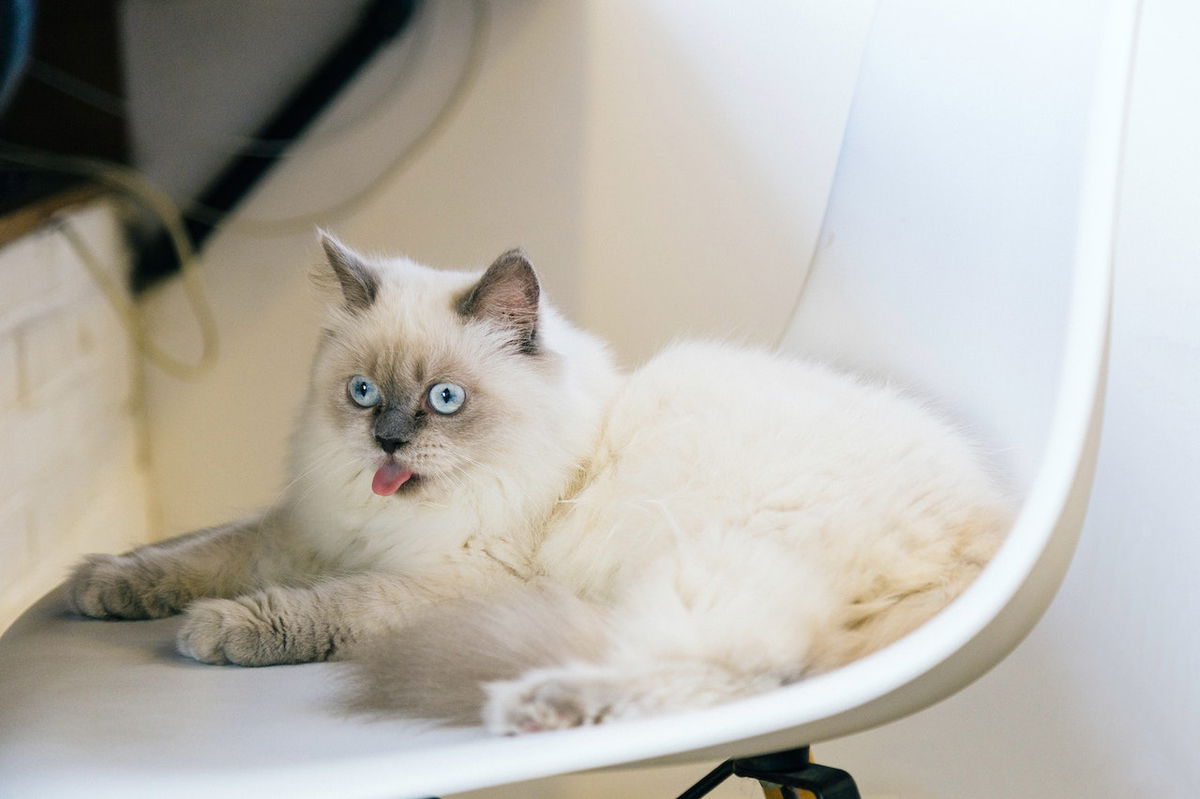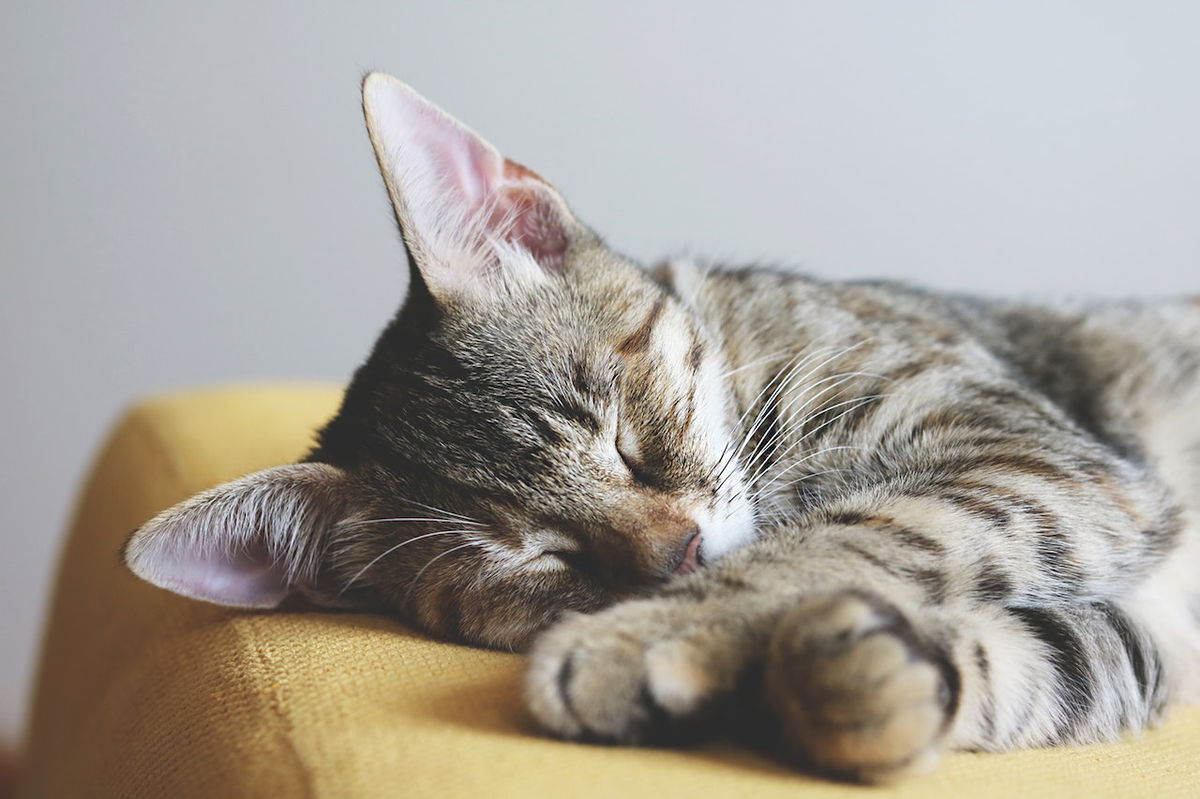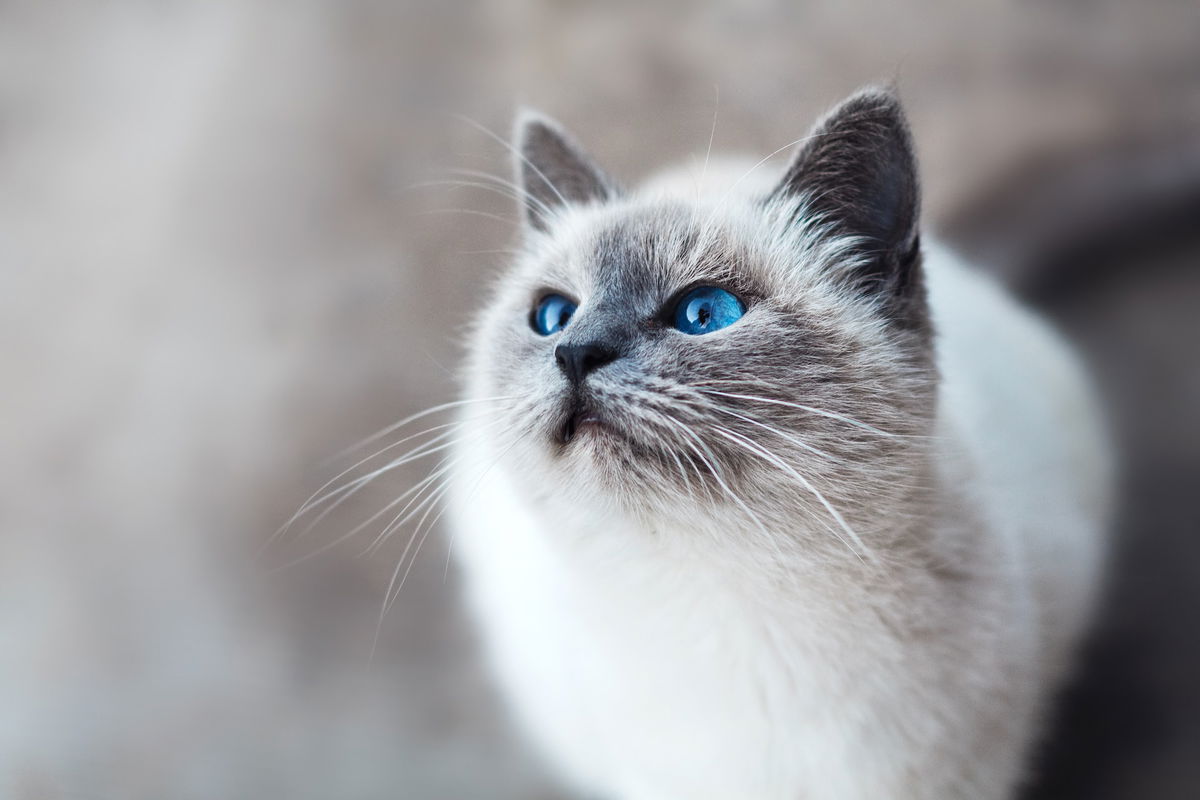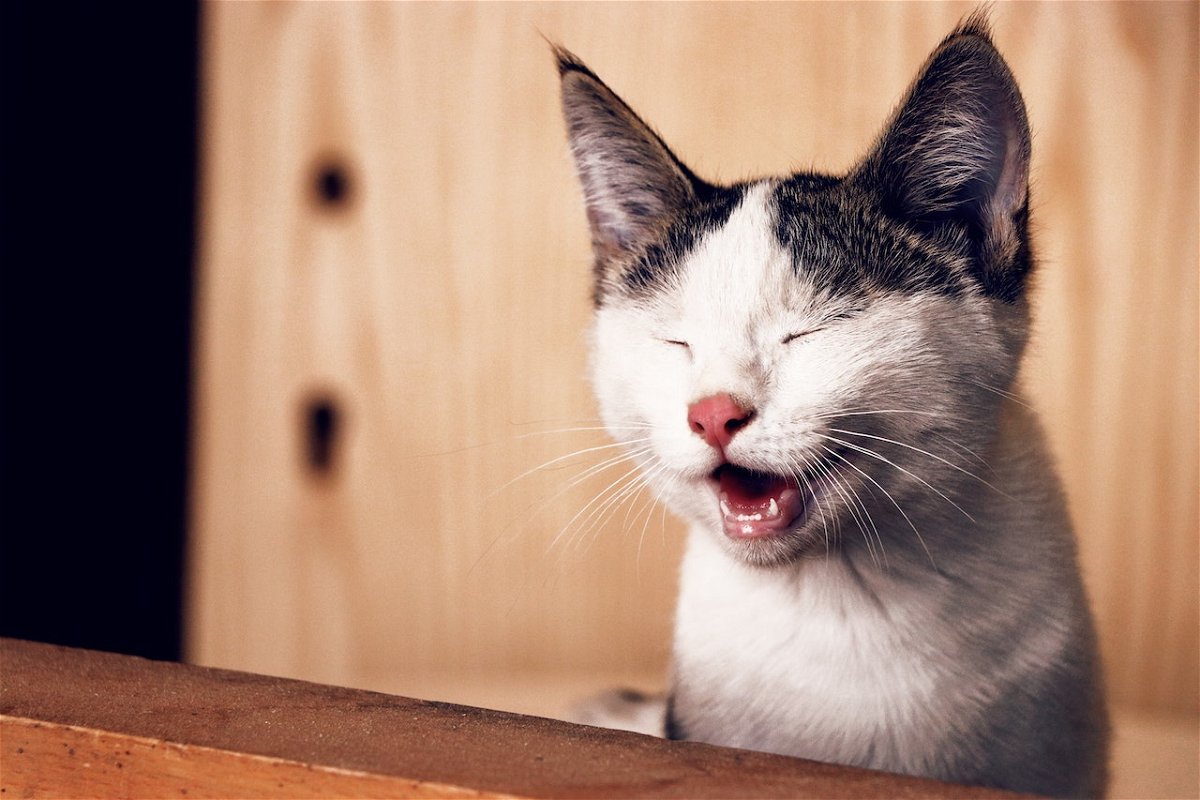We're an affiliate
We hope you love the products we recommend! Just so you know, we may collect a share of sales or other compensation from the links on this page at no additional cost to you. Thank you if you use our links, we really appreciate it!
Our feline friends are known for their unique behavior, which may sometimes leave pet parents puzzled or concerned about their health.
Cats are not heavy droolers, unlike dogs who are prone to slobber a lot. But sometimes they can get your hands wet with some sips of saliva when petting or cuddling them.
It’s also possible to see some kitty spittle when scratching beneath their chin. But, ‘Why is my cat drooling?’
Keep reading this post as we uncover the possible reasons for your cat’s drools when petting them when it should be of concern, and what you can do to prevent occasional drooling.
Is It Normal for Cats to Drool?
Nearly all animals drool, and it’s absolutely normal for cats to drool too, especially when they’re contented and relaxed.
For example, if your cat drools in response to your warm cuddles, you should have no reason to worry about internal health problems.
Drooling occurs when a pool of saliva gathers in the kitty’s mouth to the extent of overflowing on the chin when the mouth is open.
Saliva in cats is produced by five major salivary glands, which do not cause cats to drool too much compared to their canine housemates.
For the most part, cats who slobber out of contentment have grown into this behavior from their kittenhood.
It is highly unlikely for a senior feline to start drooling without any apparent cause when they have never done it before.
Normal vs. Excessive Drooling in Cats
But, how can you tell the difference between normal and excessive drooling in cats?
To differentiate between occasional and persistent drooling in cats, you need to consider the context under which your cat shows the response.
In general, normal drooling should be accompanied by a happy face, excitement, and contentment from the cat.

Such situations include when your cat is purring with pleasure or kneading their paws into the pillow. This should not make you worry since it doesn’t indicate an underlying condition.
Excessive drooling on the other hand is not accompanied by pleasure and sometimes it leads to hypersalivation in cats.
Too much slavering could be an indicator that your cat might have an underlying medical condition that needs to be examined by a qualified vet.
Why is My Cat Drooling?
1. Your cat is relaxed and happy
The first assumption when your cat drools in response to petting is that they’re happy. Even though this is not a general response to contentment in all cats, some will slobber when they feel good.
Drooling due to happiness is usually accompanied by other obvious signs that show your cat is happy such as purring and rolling over the ground.
2. Your cat enjoys human cuddles
A nice cuddling session with your feline friend could cause them a physiological response that makes them drool.
This is a tell-tale sign that your furry friend feels comfortable and relaxed with your soft touches, making them trickle some drops of saliva out of love.
3. Your cat is afraid
It’s also possible that your cat is expressing fear through subtle salivation, especially when you touch them in the wrong areas.
This might be your cat’s way of coping with stress, similar to how humans may sweat when in nervous situations.
Likewise, if your feline friend develops fear over certain issues such as trips to the vet’s office, or meeting new pets, you may notice them drooling due to anxiety.
4. Catnip
The effects of catnip scent on some cats can stimulate their salivary glands causing a drooling mess for about 10 to 15 minutes.
5. Dental diseases
Feline dental diseases such as gingivitis and tooth decay can cause oral irritation and serious pain making your feline friend drool.
In this case, slobbering is a physical response the affected cats use to soothe oral discomfort and pain.

This can be exacerbated when you touch your cat’s mouth, since doing so may stimulate the affected gum and cause instant pain.
In addition to drooling, some of the other common signs of dental diseases in cats include:
- Redness and swelling along the gums
- Difficulty in eating
- Bad breath
- Preference for soft foods over dry kibble.
- Blood in saliva
- Chewing with a tilted head
- Excessive meowing
Although less common, oral neoplasia accounts for 3% of feline cancers. It is also another form of dental problem that may cause your cat to drool.
6. Feline Upper Respiratory infections
Viral infections along the upper respiratory tract may cause oral ulcerations and make the affected cat to drool.
The increased saliva flow is caused by the ulcers in the mouth and may also be a physical response to clear the excessive mucus production.
Cats with upper respiratory tract infections are also likely to show the following symptoms:
- Recurring sneezing
- Coughing
- Swelling of the mucous membrane
- Discharge from the eyes and nose
- Reluctance to eat
- Lethargy
7. Nausea
Nauseated cats are likely to drool and may also show reluctance to eat or drink. If your cat is not feeling well, they may have excessive salivation, thanks to the stimulated salivary glands.
Nauseous cats can be caused by several reasons including motion sickness, food allergies, and hypersensitivities to medication.
8. Physical trauma
An injury in the mouth or a wrong stroke on the cat’s head can cause physical trauma and make them respond with a drool.
Most kittens are likely to chew electrical cords and suffer mouth injuries which can cause them pain and oral burns, leading to excessive salivation.
Cats with oral physical trauma may require supportive care and medical attention to address the issue before it gets out of hand.
9. Bitter taste
Your cat can create a drooling mess during a petting session because they’ve licked something bitter on your arms.
This is a natural response your cat uses to flush out the bitter taste from their mouth. Drooling due to the harsh taste is highly likely to get dramatic or accompanied by sneezing.
You can help your cat wash away the unpalatable taste by offering clean drinking water.
Remember to wash your hands with clean soapy water before petting your furbaby to reduce the risk of getting a bitter lick from your arms.
10. Neurological diseases
Cats with neurological conditions may have the inability to control their food and swallow, causing them to drool when eating.
Other signs that your cat may have neurological disorders include loss of balance, difficulty moving, and general body weakness.
Feline neural diseases can be caused by various factors, and they can lead to serious effects when left unchecked.
We suggest booking an appointment with your vet if you notice any problem with your cat’s balance and coordination.
11. Swallowing a foreign body
Cats may produce too much saliva and slobber because they’ve ingested something they are not supposed to eat.
A blade of grass or paper may get stuck along your cat’s throat causing them to drool in an attempt to expel the foreign body from the system.
Cats that have ingested a foreign object may paw at their mouth or try to vomit in an attempt to get the object out.
If you suspect your cat has got something stuck in their throat, we recommend inducing them to vomit or reaching out to the vet.
When You Should Be Concerned About Your Cat’s Drooling
As we pointed out in the preceding sections, occasional drooling in cats is normal and you should not be worried when your cat does it with contention and excitement.
But as a responsible cat parent, you need to know when your cat’s saliva drops may be an indication of internal problems.
Persistent and excessive drooling should be a cause for concern, especially when it continues long after the petting session.

You should make immediate contact with your veterinarian if your cat’s drooling is accompanied by any of the following symptoms:
- Bad breath
- Blood tinged in saliva
- Nasal and eye discharge
- General body weakness
- Lack of appetite
- Difficulty in breathing
- Excessive meowing
- Sudden change in behavior
- Unexplained weight fluctuation
Ways To Stop Your Cat from Drooling
If your cat is drooling excessively without any apparent trigger, we recommend taking the following practical steps to reduce chronic saliva flow:
1. Vaccinate your cat
Make sure your cat is up to date with their immunization schedule as advised by a qualified veterinarian. Unvaccinated kittens should not be allowed to roam outside freely.
Letting your cat walk outside may expose them to infections and the temptation to ingest unknown substances.
2. Regular dental care
Clean your cat’s mouth and teeth to prevent the build-up of tartar and disease-causing germs in the oral cavity.
Brushing your cat’s teeth and offering them dental treats are some of the most practical ways of maintaining good oral hygiene.
Remember to take your cat to the vet for regular dental check-ups to detect and deal with any condition in good time.
3. Clean up your home
Make sure to clean up your home to remove all potential toxins that may cause your cat to get sick and slobber a lot.
Items that may be potential allergens to your cat including laundry products should always be kept away from their reach.
It helps to know all the cat-toxic houseplants and remove them from your home to ensure your cat stays in a safe environment.
Frequently Asked Questions (FAQs)
1. Is cat drool harmful to humans?
Oral contact with cat drool can be harmful to humans, especially those with a weakened immune system.
Cats can host several bacteria in their mouth, most of which have been linked with various human illnesses including salmonella disease and giardiasis.
2. Why does my cat drool when he purrs?
This is a clear sign that your cat is contended and happy with their current state. Drooling while purring is a physiological response of heightened relaxation and it should not cause you to worry.
3. Why is my cat drooling all of a sudden?
Sudden cat drools can indicate that your cat is suffering from an underlying medical condition causing excess salivation.
This could be anything from a dental disease, respiratory tract infection, diabetes, or kidney-related conditions.
The sudden onset of drooling can also be linked to physical responses to allergic reactions and ingestion of toxic substances.
4. Why is my cat drooling thick saliva?
Thick saliva can be a sign of dehydration or dental problems. Lack of enough water can make your cat’s saliva get heavier than usual.
Dental diseases may also cause inconsistency in saliva production making it thicker or sometimes thinner.
5. Why does my cat drool when I pet him?
For the most part, cats may drool when being petted because of extreme relaxation and happiness.
Your cat is most likely contented with your gentle strokes and this may trigger a physiological response in the form of salivation.
Drooling due to heightened relaxation is totally harmless and should not cause you to worry.
However, if your cat drools while showing signs of pain, it may be due to an underlying problem or you may have pricked an injured gum stimulating the production of excessive saliva.
6. Why is my cat drooling and throwing up?
Your cat may have ingested a toxin or a foreign body such as a blade of grass, that forces them to expel it from the system by vomiting.
Conclusion – Why is My Cat Drooling?
There are various reasons why your cat may drool during a petting session. It could either be occasional saliva droplets caused by happiness or sudden slobber due to internal problems.
It’s important to observe your cat’s body language and behavior accompanying the drool to rule out any medical condition.
Keep in mind that drooling is not a problem by itself, this is just your cat pouring out saliva because of any of the reasons discussed above.
If you suspect your cat’s excessive saliva is a physical response to internal problems such as illness, we recommend scheduling an appointment with your vet for an exam and prompt treatment.
In case of ingesting s foreign body, your vet may prescribe a simple homemade formula to induce vomiting and flush out the unwanted objects.
Laura is the founder of Furs'n'Paws. She is a also a pet writer and expert with more than 20 years of experience of working with dogs and cats. She developed a very strong love for animals at a young age. Her passion led her to establish a thriving pet sitting and dog walking business in Dubai. As an expert in pet training, behavior, and nutrition, Laura is committed to helping pet owners and pet lovers by offering high-quality information on a wide range of topics.



No responses yet